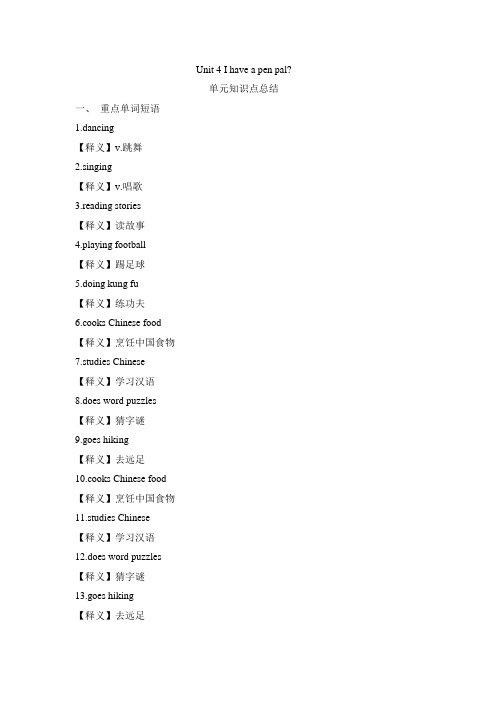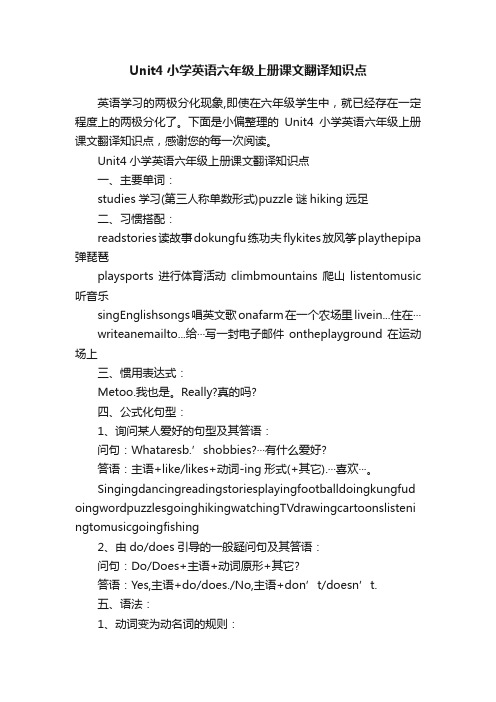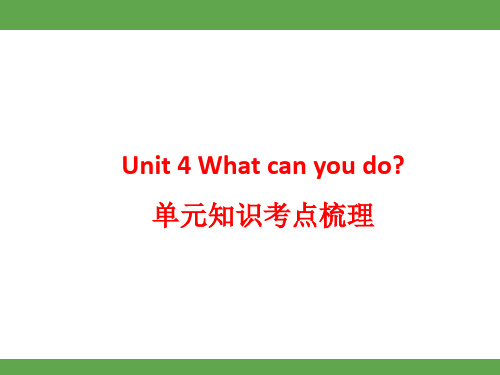Unit4 课文单词学习
2019人教版高中英语必修一Unit 4 阅读课 单词 课文预习(

UNIT 4 NATURAL DISASTERS --Reading and Thinking单词,课文预习一.词汇预先知Ⅰ.单词——记其形1.come to their __rescue营救他们2.cause damage to his health 损害他的健康3.destroy hopes 摧毁希望4.build shelters for the homeless 为无家可归者搭建庇护所5.ruin our trip 毁坏我们的旅行6.30 percent students 百分之三十的学生7.be trapped in the__ruins 被困在废墟中8.bury the dead 埋葬死者9.make greater efforts 尽更大的努力Ⅱ.单词——知其意1.disaster n.灾难;灾害2.tornado n. 龙卷风;旋风3.drought n. 旱灾;久旱4.landslide n. (山地或悬崖的)崩塌;滑坡5.slide vi.&vt. (使)滑行;滑动6.tsunami n. 海啸7.flood n. 洪水;大量vi. 淹没;大量涌入vt. 使灌满水;淹没8.magnitude n. (地)震级;重大9.evacuate vt. 疏散;撤出vi. 撤离10.helicopter n. 直升机11.crack n. 裂纹;裂缝vi.&vt. (使)破裂12.gas n. 汽油;气体;燃气13.brick n. 砖;砖块14.metal n. 金属15.electricity n. 电;电能16.unify vi.&vt. 统一;(使)成一体17.context n. 上下文;语境;背景Ⅲ.单词——通其变1.death n.死;死亡→dead adj.无生命的2.shock n.震惊;令人震惊的事;休克vt.(使)震惊→shocking adj.令人震惊的→shocked adj.感到震惊的3.breathe vi.& vt.呼吸→breath n.呼吸4.revive vt.& vi.复活;(使)苏醒→revival n.振兴;复苏5.suffer vt.遭受;蒙受vi.(因疾病、痛苦、悲伤等)受苦→suffering n.折磨;苦难6.wisdom n.智慧;才智→wise adj.明智的;聪明的7.affect__vt.影响;(疾病)侵袭;深深打动→effect n.效果,作用Ⅳ.词块——英汉译1.as if 似乎;好像;仿佛2.in ruins 严重受损;破败不堪3.in shock 震惊;吃惊4.set up 建立5.as usual 像往常一样6.come to an end 结束7.the number of ……的数量8.dig out 挖掘9.a home to ……的家园10.go through 经历11.be gone 没有了12.provide medical care 提供医疗服务二.课文精研读原文呈现THE NIGHT THE EARTHDIDN’T SLEEPStrange things were happening in the countryside of northeastern①Hebei.For several days, the water in the village wells② rose③ and fell,rose and fell.There were deep cracks that appeared in the well walls.At least one well had some smelly④ gas coming out of it【1】.Chickens and even pigs were too nervous to eat【2】,and dogs refused to go inside buildings.Mice ran out of the fields looking for places to hide【3】,and fish jumped out of the water.At about 3:00 a.m., on 28 July 1976, bright lights were seen in the sky outside the city of Tangshan and loud noises were heard.But the city’s one million people were asleep⑤ as usual⑥ that night.【1】“coming out of it”在此为现在分词短语作后置定语,修饰gas。
六年级上册英语-Unit4 Lesson21 Christmas Cards【冀教版】

六年级上册英语-Unit4 Lesson21 Christmas Cards一、单词学习1.Christmas cards - 圣诞卡片2.big - 大3.small - 小4.green - 绿色的5.red - 红色的6.star - 星星7.tree - 树二、课文学习1. New words•merry - 愉快的•elf - 小精灵•special - 特别的•season - 季节•light - 光2. Drills•(问候)Merry Christmas!•(回答)Merry Christmas!•(提问)What’s this?•(回答)It’s a Christmas tree.•(提问)What’s that?•(回答)It’s a star.3. Let’s talk•A: Merry Christmas!•B: Merry Christmas!•A: What’s this?•B: It’s a Christmas tree.•A: What’s that?•B: It’s a star.4. Comprehension•What is the season of Christmas called in English? - It is called ‘Christmas season’.•Which is the most special night of the season? - The most special night of the season is Christmas Eve.•What do people put on the Christmas trees? - People put lights, decorations and ornaments on the Christmas trees.5. Reading aloudMerry Christmas to everyone! Christmas is a special season in the year. People put up Christmas trees and decorate them with lights, ornaments, and decorations. On Christmas Eve, people usually exchange small gifts and cards with each other. Christmas cards come in big and small sizes, and they have different designs. Some have a picture of Santa Claus, some have snowflakes, and some have other Christmas things. You can even buy cards with your favorite cartoon characters on them!6. Exercises1.我们在哪个节日里送圣诞卡片? - 我们在圣诞节季节里送圣诞卡片。
人教英语PEP版四年级上册_Unit4_知识详解

Unit4 知识详解A Let’s talk 知识详解重难点1. 询问人/物品具体位置的句型(1)——Where is ...?课文应用:Where is she? 她在哪儿?She’s in the kitchen. 她在厨房里。
句型结构:问句:Where is + 人/物品(单数)(she, my sister, my bag...)?答语:人/物品+ is + 表示地点的介词短语(in the room, on the desk, on the wall...). 重点解析:问句:是一个由where引导的特殊疑问句,用于询问人或物品的具体位置,属于wh问句(be型)基本框架:疑问词+ be动词+ 人/物?Where is she?where意为“在哪儿”,有以下几种用法:①询问物品的位置。
例如:Where is my bag? 我的包在哪儿?②询问某人的位置。
例如:Where is Miss Bai? 白小姐在哪儿?③询问某个地方的具体位置。
例如:Excuse me, where is the post office? 打扰一下,邮局在哪儿?生活实例:Jack找不到他的足球了,于是他问妈妈:Jack: Mum, where is my football? 妈妈,我的足球在哪儿?Mum: It is under the bed. 它在床下面。
易错提示:使用这个句型的时候,不要受汉语的影响而丢掉be动词(is)。
此外,这个句型中需要使用表示人或物品的单数名词/代词。
2. 确认人/物品具体位置的句型(1)课文应用:Is she in the living room? 她在客厅里吗?No, she isn’t. 不,她不在。
句型结构:问句:Is + 人/物品(单数)(she, my sister, my bag...) + 表示地点的介词短语(in the room, on the desk, on the wall…)?答语:Yes, he/she/it is. /No, he/she/it isn’t.重点解析:这个问句用于确认人或物品的具体位置,属于Be型疑问句,基本框架:Be动词+ 人/物+ 其他?Is she in the living room?我们已经在前面学习过用where来询问人或物品的具体位置,这里我们学习用is 引导的一般疑问句来确认单数的人或物品的具体位置。
Unit4BodyLanguage单词课文详解课件高中英语人教版选择性(完整版)4

词汇 PART 01
10. identical [aɪˈdɛntɪkəl] adj. 同一的;完全相同的 be identical to/with = be the same as =be similar to (be different from)
The two pictures are similar, although not identical. 这两幅画很相似,虽然不完全相同。 In effect, the two systems are identical. 实际上,这两种系统完全一样。
2) 这家宾馆每个房间的费用由20美元到30美元不等。 The charge for a room in this hotel _____ $20 and $30. varies between
3) 一般来说水果和蔬菜价格随季节变化而变化。 Generally speaking, prices of fruit and vegetables _____ the season. vary with
词汇 PART 01
16. waist n. 腰,腰部 He put his arm around her waist. 他搂住了她的腰。
词汇 PART 01
17. make inferences 推理;推断 A human can sometimes make inferences based on previous knowledge. 人们有时可以根据前面的知识进行推断
vary in 在……方面不同 vary with 随着……而变化 vary from 不同于…… vary from ... to ... vary between ... and ... 由……到……情况不等
四年级英语上册Unit4课文知识点

四年级英语上册Unit4课文知识点英语这个东西很好,他还可以去交流,他还可以跟不同的人说话。
下面是小偏整理的四年级英语上册Unit4课文知识点,感谢您的每一次阅读。
四年级英语上册Unit4课文知识点一、u_字母发音(熟背):u_e[ju:]use使用cute可爱的excuse原谅tube管道mule骡子u[ʌ]duck鸭cut切mum妈妈bus巴士jump跳puppy小狗but 但是uncle叔叔fun开心under下面study书房us我们二、单词(熟记):bedroom卧室livingroom客厅study书房kitchen厨房bathroom卫生间bed床phone电话table桌子sofa长沙发fridge冰箱find找到them他们三、重点词组(熟背)Gotothelivingroom.WatchTV去客厅,看电视Gotothestudy.Readabook去书房,读书Gotothekitchen.Haveasnack去厨房,吃零食Gotothebedroom.Haveanap去卧室,睡觉Gotothebathroom.Takeashower.去浴室,洗澡四、句型(熟记):Whereisshe?她在哪里?Sheisinthekitchen.Wherearetheye?她在哪里?Theyareinthekitchen.Issheinthestudy?No,sheisn’t.她在书房里吗?不,她不在。
Issheinthelivingroom?No,sheisn’t.她在客厅里吗?不,她不在。
Issheinthekitchen?Yes,sheis.她在厨房里吗?是,她在。
Isitinyourdesk?Yes,itis.它在你的课桌里吗?是,它在。
Isheintheclassroom?No,heisn’t.她在教室里吗?不,她不在。
Aretheyonthetable?No,theyaren’t.它们在桌子上吗?不,它们不在。
Unit4Ihaveapenpal(知识清单)人教PEP版英语六年级上册

Unit 4 I have a pen pal?单元知识点总结一、重点单词短语1.dancing【释义】v.跳舞2.singing【释义】v.唱歌3.reading stories【释义】读故事4.playing football【释义】踢足球5.doing kung fu【释义】练功夫6.cooks Chinese food【释义】烹饪中国食物7.studies Chinese【释义】学习汉语8.does word puzzles【释义】猜字谜9.goes hiking【释义】去远足10.cooks Chinese food【释义】烹饪中国食物11.studies Chinese【释义】学习汉语12.does word puzzles【释义】猜字谜13.goes hiking【释义】去远足二.重点句式1.【课文应用】He likes reading stories.他喜欢读故事。
当我们想要表达自己的喜好时,经常会用到like这个词。
例如:I like sports.我喜欢体育运动。
如果要表达“喜欢做某事”,like后面要接动词ing形式或动词不定式。
例如:I like playing football./I like to play football.我喜欢踢足球。
2.【课文应用】What are Peter's hobbies?彼得的爱好是什么?He likes reading stories.他喜欢读故事。
【句型结构】问句:What are+his/her/名词所有格+hobbies?答语:He/She likes+动词ing形式(+其他).【重点解析】问句是由what开头的特殊疑问句,what意为“什么”。
答语中的主语为第三人称单数,谓语动词要用like的第三人称单数形式likes。
【生活实例】兴趣小组报名开始了,Miss Li询问Bob的爸爸Bob的爱好是什么。
让我们来看一看他们的对话:Miss Li:What are Bob's hobbies?鲍勃的爱好是什么?Bob's dad:He likes swimming and dancing.他喜欢游泳和跳舞。
Unit4小学英语六年级上册课文翻译知识点

Unit4小学英语六年级上册课文翻译知识点英语学习的两极分化现象,即使在六年级学生中,就已经存在一定程度上的两极分化了。
下面是小偏整理的Unit4小学英语六年级上册课文翻译知识点,感谢您的每一次阅读。
Unit4小学英语六年级上册课文翻译知识点一、主要单词:studies学习(第三人称单数形式)puzzle谜hiking远足二、习惯搭配:readstories读故事dokungfu练功夫flykites放风筝playthepipa 弹琵琶playsports进行体育活动climbmountains爬山listentomusic 听音乐singEnglishsongs唱英文歌onafarm在一个农场里livein...住在···writeanemailto...给···写一封电子邮件ontheplayground在运动场上三、惯用表达式:Metoo.我也是。
Really?真的吗?四、公式化句型:1、询问某人爱好的句型及其答语:问句:Whataresb.’shobbies?···有什么爱好?答语:主语+like/likes+动词-ing形式(+其它).···喜欢···。
Singingdancingreadingstoriesplayingfootballdoingkungfud oingwordpuzzlesgoinghikingwatchingTVdrawingcartoonslisteni ngtomusicgoingfishing2、由do/does引导的一般疑问句及其答语:问句:Do/Does+主语+动词原形+其它?答语:Yes,主语+do/does./No,主语+don’t/doesn’t.五、语法:1、动词变为动名词的规则:动词变为动名词,即是动词加ing。
Unit4Whatcanyoudo?单元知识考点梳理课件(共29张PPT)

pong, but I can’t swim.
球,但我不会游泳。返Leabharlann 目录课文翻 译
Read and write
What can you do? Please send
me an email at
robin@.
Robin
续表
读一读,写一写 你会做什么?请给我 发电子邮件至 robin@。
about you, John?
翰,你呢?
返回目录
课
文
翻 译
Let’s talk
一起说
续表
John: I can do some kung fu! Miss White: Thank you, John.
约翰:我会练些武术! 怀特老师:谢谢你,约翰 。
返回目录
句 型
1.(教材P.36) —I can play the pipa. 我会弹琵琶。
解 swim. I can speak English. I can play basketball and football.
I can’t cook. But I’m helpful at home. I often help my mother
clean the bedroom. I can help my father water flowers. I
②Tom can’t play the piano. 汤姆不会弹钢琴。
返回目录
3.(教材P.43) I can play ping-pong, but I can’t swim. 我会 句 型 打乒乓球, 但我不会游泳。 透 析 [句型结构] 主语+ can +动词原形+其他, but +主语+
- 1、下载文档前请自行甄别文档内容的完整性,平台不提供额外的编辑、内容补充、找答案等附加服务。
- 2、"仅部分预览"的文档,不可在线预览部分如存在完整性等问题,可反馈申请退款(可完整预览的文档不适用该条件!)。
- 3、如文档侵犯您的权益,请联系客服反馈,我们会尽快为您处理(人工客服工作时间:9:00-18:30)。
Unit FourWhy Marriages FailWords and Expressions1. (Para. 1) end in: have sth. as a result at the end*Their expedition nearly ended in disaster when one of the climbers slid off the mountain.*One in three marriages ends in divorce.2. (Para. 1) sacred: adj.relating to a god or religion; very important or greatlyrespected*Certain animals were considered sacred.*The Japanese regard Mount Fuji as a sacred mountain.3. (Para. 1) ring: vi. to be full of a continuous high sound*The church bells are ringing.*屋里笑声欢腾。
(The room rang with laughter.)4.(Para. 1) be destined for: seem certain to happen at some time in the future; betravelling to a particular place*She seemed destined for a successful career.*We were destined never to meet again.Patterns:be destined for 预定,指定;以…为目的地的be destined to sth. 预定,指定be destined to do sth. 一定会…5. (Para. 1) quantify: vt. [fml] measure (an amount or quantity)*The damage caused to the tourist industry is difficult to quantify.*黑市经营的情况无法量化。
(It is impossible to quantify the extent of the black economy.)6.(Para. 2) peril: n. sth. that causes danger, esp. of being harmed or killed*They put their own lives in peril to rescue their friends.*难民有饿死的危险。
(The refugees were in peril of death from hunger.)7.(Para. 2) plague:1) n. a person or thing causing trouble or irritation*London’s fogs used to be a plague to its residents.*员工偷盗常常是饭店苦恼的事。
(Staff theft is usually the plague of restaurants.)2) vt. cause pain, suffering, or trouble to someone, esp. for a long period of time*Financial problems continued to plague the company.*He was plagued by eye troubles.8. (Para. 2) turbulent: adj. violent and disorderly; having a restless or uncontrolledquality and a lot of sudden changes*Jason grew up in the South during the turbulent years of the 1960s.*他的政治生涯动荡不堪。
(He has had a turbulent political career.)Collocations:turbulent emotions 紊乱的情绪a turbulent crowd 骚动的人群turbulent weather 恶劣的天气CF: turbulent, violent & fierce这些形容词均含“剧烈的,凶猛的,狂暴的”之意。
turbulent 正式用词,多用于描写风和水,也可指心神不定或控制不住的感情波动。
violent 普通用词,指人时强调极为不安,异常激动,暗含有暴力倾向;也指破坏性的或不可控制的自然力量。
fierce普通用词,指人或兽的凶猛残酷。
Directions: Fill in the blanks with the words above.1) The dog was standing at the grave, looking ____ and growling. (fierce)2) He had a reputation for turning ______. (violent)3) Rogers is a young player with a _____ love for the game. (fierce)4) Change has become a constant in the _____ economy of deregulation and globalcompetition. (turbulent)5) Thirty-one people have been injured in _____ incidents throughout the day. (violent)6) We would do well to ponder the anguish of those ______ years. (turbulent)9.(Para. 3) unconscious:adj.unable to see, move, feel, etc. in the normal waybecause of unconsciousness*Billy was unconscious for two days after the accident.*他们发现她躺在地板上不省人事。
(They found her lying unconscious on the floor.)10. (Para. 3) femininity:n.features and qualities considered to be typical ofwomen, esp. qualities that are gentle, delicate, andpretty*You don’t have to lose your femininity to be an independent, successful woman.*加上一条丝巾更显女人味儿。
(Add a silk scarf for femininity.)NB: femininity的反义词为masculinity,意为“男性,阳性;男子气”;其形容词形式feminine意为“有女人味的,女性的”;masculine,“男性的,具有男子气质的”。
11. (Para. 3) gamble away: lose the whole of an amount of money by gambling*The men have been gambling away all night.*他赌博输掉了他一半的财产。
(He has gambled away half his fortune.)12. (Para. 3) obese: adj. [fml] very fat; unhealthily fat*He may not be clinically obese, but he certainly needs to lose a lot of weight.*又胖又懒危害健康。
(Being obese and lazy is dangerous to health.)13.(Para. 4) blend: vt. mix together thoroughly, esp. so that the different parts canno longer be separated*Beat the egg yolks with 2 tablespoons of water and blend them into the white sauce.*Children love the play because it blends the human and animal worlds.CF: blend, mix & combine这些动词均含“混合”之意。
blend 混合与其成分性质一致的物体,强调混合整体的统一性与和谐性。
例如:A grocer used to need to know how to blend tea. 杂货商以往都必须知道如何混合茶叶。
mix 含义广泛,强调混合的一致性,混合的各成分可能按原样存在,但不一定能辨别出来。
例如:You can mix blue and yellow paint to make green one. 你可以把蓝色和黄色颜料混合成绿色。
combine 通常用于化学反应中,指化合物等。
例如:Oxygen and hydrogen do not combine at room temperatures. 氧和氢在室温下不会起化合作用。
14. (Para. 4) trap:1) vt. force sb. or sth. into a place that they cannot escape from*Police have the man t rapped inside a bar on the city’s southside.2) n. hidden equipment used for catching sb. / sth.; an unpleasant or difficultsituation that is hard to escape from*Slow down — there are speed traps along this stretch of road.*人们很容易陷入一种困境,即借贷超过自己偿还能力的款额。
